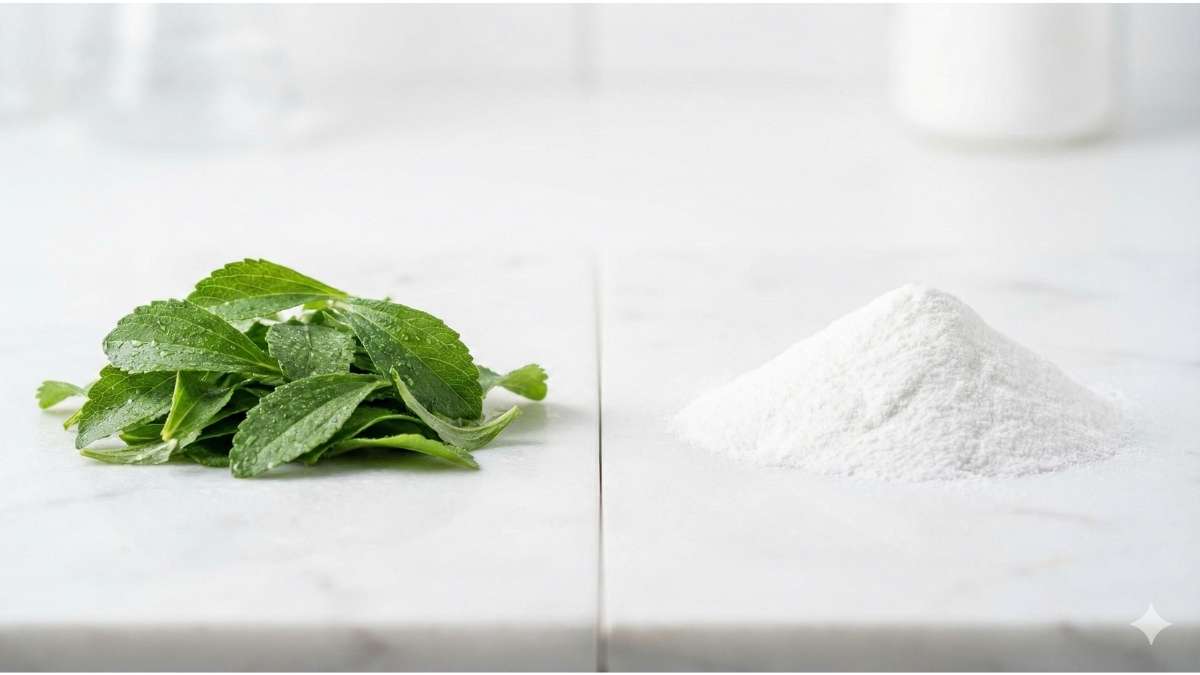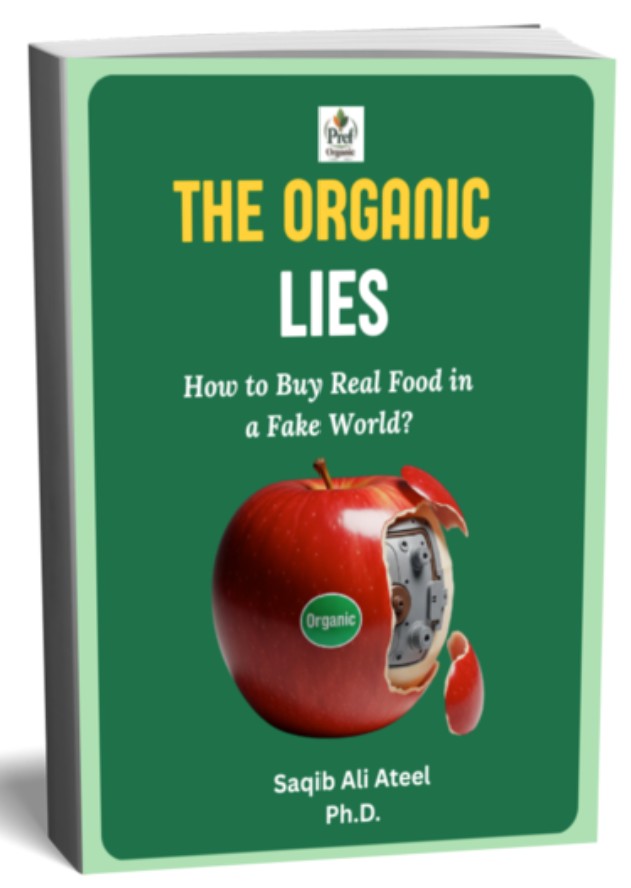Does Stevia Break a Fast? The Purity Check for Keto, IF,
and Peak Metabolic Health
The single most confusing question in the world of intermittent fasting and ketogenic living is this: does stevia break a fast?
You are doing the hard work. You are counting your hours, managing your hunger, and sticking to your plan because you want real, sustainable metabolic results. But you’ve seen the conflicting headlines, and you need a reliable answer before you put a single drop of sweetener in your morning coffee or tea.
I understand that anxiety completely. As a student focused on agricultural science, and someone who grew up farming and now maintains a strict organic home garden, I spend my days separating fact from marketing fluff—whether it’s about soil health or what we put into our bodies.
Here is the definitive, nuanced verdict we will prove together:
Pure stevia extract does not break a fast.
However, the vast majority of products marketed as “stevia” are secretly loaded with fast-breaking fillers. Your metabolic safety hinges entirely on performing a meticulous Purity Check.
We are going to give you the confidence to be your own expert. We’ll dive into the science of blood sugar and gut hormones, and then—most critically—we’ll equip you with the essential, step-by-step Purity Protocol to vet every label like a detective.
Essential Purity Guide: Mastering Intermittent Fasting with Stevia
- 🌿 The Metabolic Truth: Discover why pure stevia extract remains metabolically inert, allowing you to maintain deep ketosis and fat-burning without triggering a restrictive insulin response.
- ⚠️ Hidden Saboteurs: Learn to identify high-glycemic fillers like Maltodextrin and Dextrose that are frequently hidden in commercial powders and can instantly halt your fasting progress.
- 🧪 Appetite Regulation: Uncover the science of how steviol glycosides may interact with gut receptors to promote GLP-1 secretion, naturally suppressing hunger during your fasting window.
- 🔍 The Purity Protocol: Equip yourself with a step-by-step label auditing system to vet every sweetener, ensuring your coffee additions support rather than sabotage your cellular longevity.
I. Defining the Fast: Stevia’s Impact on Your Metabolic
Goals
When we ask, "does stevia break a fast," the answer depends on why you are fasting. The metabolic impact of a substance is measured against whether it triggers key nutrient-sensing pathways.
Goal 1: Weight Loss and Sustained Ketosis
For most people, the primary goals of Intermittent Fasting (IF) are to manage weight and achieve metabolic switching—shifting the body from burning glucose to burning stored fat, producing ketones (ketosis).
Since pure stevia leaf extract contains negligible calories and zero carbohydrates, it easily passes the primary tests for maintaining ketosis. The body remains in a sustained state of fat oxidation, meaning you continue to access and burn your fat stores for fuel, exactly as intended.
Research shows that stevia can be a brilliant tool for adherence. Studies comparing stevia consumption to high-calorie sugar consumption found that participants reported similar levels of satiety and did not compensate by overeating at subsequent meals. You can see this as a huge win: Stevia lets you manage that psychological craving for sweetness without compromising the metabolic benefit.
Goal 2: Improving Insulin Sensitivity and Blood Sugar
Control
If you are using fasting to address metabolic syndrome, insulin resistance, or Type 2 Diabetes—a common goal for our advanced readers—the focus is strictly on blood glucose and insulin dynamics.
Pure stevia is metabolically inert enough that it does not disrupt these sensitive systems. Clinical trials involving patients with Type 2 Diabetes have demonstrated that long-term consumption of the purified component, Rebaudioside A (Reb-A), did not negatively alter fasting blood glucose levels. In fact, some evidence suggests steviol glycosides may have a beneficial insulinotropic effect, potentially stimulating insulin secretion in a glucose-dependent manner and improving glucose uptake in fat cells.
Growing up on a farm, I learned that what matters most is the source. The reason stevia works for blood sugar control is that the purified extract is far removed from the rapid, inflammatory response caused by refined sugar. When you stick to pure extract, you are choosing a low-impact substance that supports, rather than sabotages, your blood sugar goals.
Goal 3: Autophagy and Cellular Longevity (The Strict
Standard)
Autophagy is the cellular cleanup and recycling process—the deep maintenance that occurs during extended fasts (often beyond 48 hours). This process is highly sensitive to any nutrient signal that activates the mTOR pathway.
Because the absence of nutrient signals induces autophagy, some experts maintain that all forms of sweetness, even non-caloric ones, should be avoided during these deep longevity fasts. This is based on theoretical caution, not definitive proof that stevia specifically interferes.
If your fast is a common 16:8 or 5:2 regimen focused on fat burning and blood sugar, pure stevia is safe and a strategic aid. If you are pursuing a multi-day fast (e.g., 72 hours) specifically for maximum cellular cleanup, the absolute gold standard is plain water, black coffee, or unsweetened herbal tea only. This gives your system zero potential signals to interpret.
II. Metabolic Mechanics: The Science of Sweetness and
Insulin
To confidently answer the question, does stevia break a fast, we have to address the most persistent myth in the NNS world: the Cephalic Phase Insulin Response (CPIR).
Debunking the CPIR Myth 🧠
The CPIR hypothesis is a common source of anxiety for fasters.
The theory holds that the simple act of tasting sweetness on the tongue—even from zero-calorie stevia—tricks the brain into anticipating sugar. This anticipation supposedly triggers a small "phantom" release of insulin, which drops your blood sugar slightly, making you hungrier and leading you to overeat later.
However, the research proves that this simple narrative does not hold up to close scientific examination. Rigorous studies using sweet, non-caloric stimuli confirm that the sweet taste alone is insufficient to induce a significant CPIR or trigger the metabolic cascade needed to halt your fast.
The initial taste of pure stevia does not initiate the rapid hormonal signal required to break a fast. You can set aside the fear of the "phantom insulin spike" as long as the product is pure.
Stevia’s Secret Weapon: GLP-1 and Appetite Control
Beyond simply being neutral, pure stevia may actually offer a metabolic benefit that assists fasting.
Steviol glycosides (the sweet compounds in the leaf) interact with certain receptors in your gut lining, promoting the secretion of a crucial gut hormone called Glucagon-like Peptide-1 (GLP-1). GLP-1 is a key player in appetite regulation and glucose control. It enhances satiety (fullness) and slows gastric emptying.
By stimulating GLP-1, pure stevia may naturally suppress feelings of hunger, making it easier to stick to your fasting window. This is why we consider pure stevia a strategic tool—it satisfies a sensory need while potentially supporting your physiological goal of feeling full and in control.
III. The Purity Protocol: A Label Reading Masterclass
 Choosing the natural leaf extract over processed white powders is the key to maintaining a true fast.
Choosing the natural leaf extract over processed white powders is the key to maintaining a true fast.This is the most crucial section of this guide. Your fast-breaking risk isn't Stevia, but the invisibility of products that aren't Stevia. To protect your metabolic investment, you must become a meticulous label auditor.
The safest product for intermittent fasting is pure liquid stevia extract. Look for a dark bottle listing only one to three ingredients: Stevia Leaf Extract (or Rebaudioside A), Water, and/or a minimal amount of food-grade Alcohol. This bulk-free liquid is highly concentrated, requiring only a few drops to sweeten your coffee or tea.
Category 1: Immediate Rejection List (The Guaranteed
Fast-Breakers)
These ingredients are high-glycemic carbohydrates that will immediately and severely compromise your fast. If you see them listed, walk away.
Immediate Rejection List: Guaranteed Fast-Breakers 🚨
| Ingredient 🌿 | The Metabolic Sabotage 📉 | Why It Breaks the Fast 🚨 |
|---|---|---|
| Maltodextrin | A highly processed polysaccharide from corn, rice, or wheat. | 🛑 Has a Glycemic Index (GI) often higher than table sugar. It causes a rapid, massive insulin spike, instantly stopping ketosis and fat burning. |
| Dextrose (Glucose) | A simple sugar chemically identical to glucose. | 🛑 Used as a cheap bulking agent. Even in small amounts, it’s a pure carbohydrate signal that triggers insulin release, terminating the fasted state. |
The reason companies use these is that stevia is so potent, you’d need a microscope to measure a serving size. They add Maltodextrin or Dextrose to create a powder that measures spoon-for-spoon like sugar, but you are paying for cheap, refined carbs.
Category 2: The Controversial Filler (Use with Extreme
Caution)
This is where the nuance is critical, especially for a health-conscious reader looking for stevia without erythritol.
Erythritol is a sugar alcohol that is one of the most common bulking agents in powdered stevia blends (e.g., Truvia brand).
Metabolic Safety: The Good News
From a fasting perspective, erythritol is technically safe. Studies show that acute doses do not affect blood glucose or insulin levels. Its Glycemic Index is 0, and its Insulinemic Index is extremely low. It passes through the body largely unmetabolized, meaning it won’t interrupt ketosis or blood sugar management.
Cardiovascular Controversy: The Crucial Warning
As a PhD scholar, I must share the emerging science that introduces a significant element of caution. Recent Cleveland Clinic research indicates that consuming foods with erythritol may increase the risk of cardiovascular events, such as heart attack and stroke, by increasing platelet activity.
For an advanced audience focused on metabolic optimization—who often have pre-existing risk factors like obesity or diabetes—this potential long-term risk demands vigilance. While older studies classify erythritol as "Generally Recognized As Safe" (GRAS), the new data suggest that if your goal is peak metabolic and cardiovascular health, you should follow the stevia without erythritol protocol. Stick to pure liquid extracts to minimize all unnecessary chemical input.
Category 3: The Ambiguous and Highly Processed
Ingredients
Scan the label for these "red flags" that compromise the goal of purity and gut rest:
- "Natural Flavors": These are proprietary mixtures added to mask stevia’s metallic aftertaste. They lack transparency and are best avoided by the advanced faster who prioritizes minimal chemical input and absolute gut rest.
- Inulin or Other Fibers: These are sometimes used as bulk. While non-caloric, large amounts can stimulate digestion and cause gastrointestinal distress (bloating, gas), significantly disrupting your comfort and the goal of gut rest.
- GE Corn Sourcing: Many commercial brands like Stevia in the Raw use dextrose derived from genetically engineered corn, and many erythritol products also start with GE corn. For those who prioritize organic and non-GMO standards, this is a definite strike against purity.
IV. The Fasting Safety Checklist: Stevia Purity Table
The decision of whether a stevia product is safe for your fast is purely a binary choice based on its filler content. Use this table as your definitive guide when reading labels in the store.
The Stevia Purity Checklist: Safe vs. Fast-Breaking Fillers 💪
| Product Type/Ingredient 🌿 | Metabolic Safety (Insulin/Glucose) 🩸 | Cardioprotective Profile ❤️ | Fasting Compatibility (Verdict) ✅ |
|---|---|---|---|
| Pure Stevia Leaf Extract (Liquid Drops) | Safe (Zero impact on blood sugar or insulin) | Low/Standard Risk (Cleanest profile) | Gold Standard for Fasting ✨ |
| Blends with Maltodextrin/Dextrose | Dangerous (High Glycemic Load) | Low/Standard Risk (But the spike is immediate) | Guaranteed Fast Breaker 🚨 |
| Blends with Erythritol | Safe (Zero impact on blood sugar or insulin) | Caution Required (Emerging cardiovascular risk) ⚠️ | Avoid if possible; Use with extreme caution |
| Products with "Natural Flavors" | Caution (Lack of ingredient transparency) | Varies | Compromises Purity & Gut Rest 🚫 |
V. Strategic Application: Using Stevia to Enhance
Adherence
The point of this rigorous Purity Protocol is not to make fasting harder, but to give you the confidence to succeed. Once you find a pure extract, you can leverage its benefits to enhance your adherence and performance, especially when practicing stevia and keto.
Moderation and Adherence: The Minimal Effective Dose
- The Psychological Hurdle: Even if it’s zero-calorie, excessive sweetness can psychologically trigger stronger food cravings in some people, making the fast harder.
- The Practical Application: Use the minimal effective dose necessary to cut the bitterness of your black coffee or unsweetened tea. You are not trying to replicate the sweetness of a dessert. This strategic use of pure stevia turns the bitter beverage into a tool that supports your fast without compromising its integrity.
- Regulatory Limits: As a trusted friend, I also want you to be aware of the FDA's Acceptable Daily Intake (ADI), which is set at per kilogram of body weight for stevia extract. For a typical adult, this is a very generous limit that is rarely exceeded by using a few drops in a fasted window.
Vetting Other Non-Nutritive Sweeteners
If you are already vetting Stevia, you should apply the same rigorous Purity Protocol to other NNS commonly used on a keto diet:
- Monk Fruit (Mogrosides): This is another excellent natural, zero-calorie option, but it is subject to the exact same Purity Problem. It, too, must be mixed with bulk agents like Maltodextrin, Dextrose, or Erythritol to be sold as a sugar replacement. The label must be audited just as strictly as stevia—if it's not a pure liquid extract, assume it contains fast-breaking fillers.

Conclusion: Purity is Your Protection
The fear and anxiety surrounding the question, does stevia break a fast, are rooted in the misleading commercial products on the market, not the natural compound itself. Pure stevia leaf extract is a safe, effective, and strategic tool that can help you maintain metabolic health, control blood sugar, and enhance adherence to your fasting regimen.
But you must be the Proactive Protector of your metabolic health. Armed with the Purity Protocol, you are no longer a passive consumer. You know that Maltodextrin and Dextrose are metabolic saboteurs, and you understand the caution required when dealing with Erythritol.
Your success in intermittent fasting comes down to confidence and control. By choosing only pure, bulk-free liquid stevia, you are making a scientifically sound decision that supports your peak metabolic performance every day.
Further Reading
To deepen your understanding of metabolic science and ingredient integrity, I recommend these authoritative resources:
- Read more on Non-Nutritive Sweeteners and Metabolic Health
- Learn more about the Cephalic Phase Insulin Response and Sweeteners
- Explore recent research on Erythritol and cardiovascular risk

Meet Saqib
Saqib Ali Ateel is a PhD Scholar by training and a "student of the soil" by nature. He combines deep research, hands-on farming wisdom, and agricultural systems supervision to reveal what’s really on your plate. His mission is simple: to help your family navigate the food industry's complexity so you can eat cleaner, safer, and smarter.

